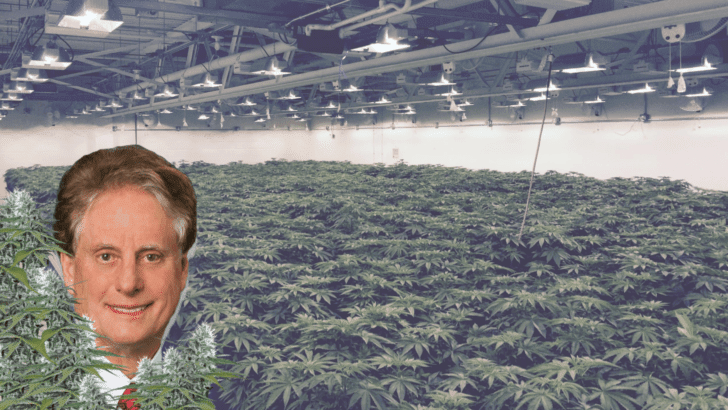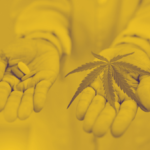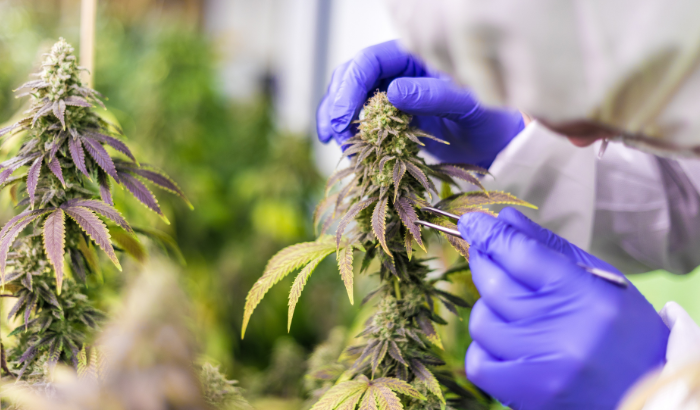
Iconic cannabis businessman points to hemp, gives Mass rec rollout relatively good grades
With some medical marijuana dispensaries running for decades, and the business of cannabis advanced to the point that some companies are publicly traded, OG status isn’t merely designated for the early home-grow wizards who took chances when the establishment was rooting against (and in some cases arresting) producers. At this juncture, the initial investors who tapped experienced growers to run bigger legal operations deserve props as well, for they took tons of risk before the bandwagons rolled through.
Bob Fireman, of the nationally focused MariMed Advisors management team, enjoys such exalted stature in the world of medical and recreational cannabis. From his helping found the landmark Thomas C. Slater Compassion Center in Providence to his work steering various investments, Fireman knows the terrain intimately and is someone who you ought to listen to for insight into where the industry is headed. I spoke with him by phone as he was driving around, somewhat lost, near Winchester, Kentucky.
What are you doing in Kentucky?
We just invested $30 million into hemp and CBD. It’s the best-quality hemp grown in the United States.
Were they growing hemp already?
Yes, they’ve been here working at the University of Kentucky for the last two or three years. Basically they’ve been in business for 20 years; they were the original genetic growers for Charlotte’s Web [cannabinoid oil and hemp products]. As we looked around the country, this was the best quality that we saw in the United States. Recognizing that hemp and CBD are hopefully declassified, as the [2018] Farm Bill [allows for more widespread cultivation of hemp].
We believe that CBD, and the wellness of cannabinoids from hemp, is going to become an industry in itself, and separate from cannabis and be allowed in every retail store. It’s healing, it’s antispasmodic.
Hemp and cannabis are cousins, and we have been extracting CBD-high strains for years. For depression, pain. In Rhode Island, in conjunction with pediatric oncologists, we were producing pure CBD for mothers of children with epilepsy. The full gamut.
Would you say the popularity of CBD has hit a fever pitch? It seems like not too long ago regulators were worried that cultivators wouldn’t be interested in growing enough of it.
The quality has gotten so strong from the new technologies and growing methods. The people who want to get relaxed and who want relief are mixing their CBD with very small pieces of THC. When those things are bonded together, they seem to have a better result, and obviously if there is a little bit of THC you’re going to get more relaxed. I think the THC is what makes it better than the synthetic stuff. We believe in natural organic, and to really take mother’s nature how she gives it to us instead of stripping it and manipulating it. We grow the strains and the compounds in the most healthy environment, and we find that the patients get a better entourage effect and more specific relief for the symptoms and conditions they are taking it for.
A few years ago, everyone thought legalized pot, and that it would be all stoners walking in wanting the highest THC content for the cheapest price so they can smoke away. But the use of cannabis is going to become more mainstream. CBD strains have become the adult flower for baby boomers who really want to function. They like to be relaxed, they like to get the benefit of the natural plant, but they also want to go out to dinner and have a martini. They don’t want something that’s going to make it so they can’t get out of their living room. … It’s going to get to the level of walking into a CVS and saying, I want this because it solves this problem for me.
You’ve provided a lot of services for a long time. What did people want a few years ago, and how have those trends evolved at the high corporate level, as opposed to what we’re seeing on the ground?
My team has been together almost 14 years. We evolved out of California, and later we developed the Slater Center in Providence as a medical process. We decided we would make best practices, we decided it wasn’t growing in your basement. This was industrial grade. How can we do compliance? How can we create operating procedures that are best in class?
We started to evolve in safety, better growing systems, better environmental controls, better use of strains for specific conditions. With the onslaught of people who run to these stores, you can see that people come back because they know the different types of products and even brands that are consistent. What’s also really evolved is the production of oils and extractions, from butane, and ethanol, and CO2 to cold press and people who can take these oils and infuse them in certain compounds and products for specific results.
Right now, in California and Colorado, people are selling CBD and THC for specific effects—this product will let you sleep, this one will get you energy, this one will give you passion. Some of those companies are evolving, and there are these new adapters. When you look at this industry, it was a $90 billion black market. We parallel alcohol and wine. But we’re only $7 billion legal. So the first order of business was to convert the people in the shadows so they can come in and have something without mold or pesticide. Now it’s about creating new adapters—elderly people who are shaking from MS, senior citizens who are being drugged in these facilities.
How much easier is it now to walk into a legislator’s office with that message than it was like five years ago?
It’s like night and day. Seriously. The first order of business was to get the doctors to not be scared that they would be taken out back and shot [if they showed interest in prescribing cannabis]. The doctors were always supportive of cannabis. They were skeptical because it was illegal because there was no peer-reviewed quality research. They watched what was coming out of Israel and Holland and they were supportive. They knew it wasn’t poison, but before they would take someone off of cancer drugs they would want to see some peer-reviewed results.
The biggest problem is that the federal prohibition stopped research. The hospitals are so dependent on federal dollars, and reimbursements through Medicare, that they wouldn’t risk messing with the federal government.
What is the mark that Massachusetts is making? What are people going to be taking away from our rollout here?
As most states adopted policies, the states that came in later got the benefit of learning from the rules and regulations [of] earlier states. The medical program in Massachusetts, which started back in ’11 and ’12, was thrown on the Department of Health, which had no experience whatsoever. And the program never rolled out effectively to create any sort of testimonials or validity before the referendum in 2016 forced adult use recreational. That scared the shit out of the municipalities.
In two or three years, it’s going to become more mainstream. In three to five years, I think the federal law will change. But what’s good about the East, what’s different from Colorado, is that there is limited licensing. It’s not 15 on a block in San Jose. I always joke that there’s 220 dispensaries in Denver and there’s only one in Providence—ours.
We get the best knowledge from places like California and Colorado and bring it back here. Massachusetts is being built from the ground up. The [Cannabis Control Commission] is doing an adequate job of understanding the needs and making it work and taking the time they need to do it. The early shops are open, and all the lines will be over in six months to a year when there’s enough shops. Everyone wanted to line up for the first few, but ultimately it’s going to be mainstream. It will all blend in.


























